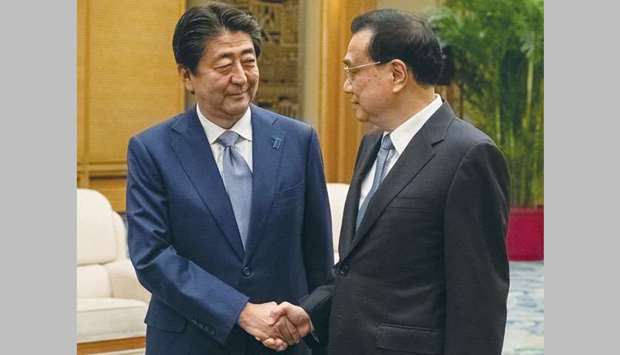Abe’s visit is part of a painstaking courtship aimed at winning over the world’s second economy after a disastrous falling-out in 2012, when Tokyo “nationalised” disputed islands claimed by Beijing.
Slowly defrosting relations have warmed rapidly in recent months as the two countries face down huge tariffs from US President Donald Trump, who is set on reducing American trade deficits with both countries.
Looking to hedge against the US leader, Abe and Chinese President Xi Jinping are expected to discuss how to improve economic cooperation between the world’s second and third largest economies when they meet today.
Japanese business is eager for increased access to China’s massive market, while Beijing is interested in Japanese technology and corporate know-how.
During a reception to celebrate the signing of the treaty that put Japanese and Chinese relations back on track after World War II, Li called for the countries to “jointly promote regional peace” and “safeguard multilateralism and free trade,” according to state broadcaster CCTV.
“Japan and China play an irreplaceable role in the economic development of Asia and even the world,” Abe said, according to CCTV, calling on both sides to work together to “promote world peace and prosperity.”
Abe’s visit is the first by a Japanese prime minister since 2011.
Since an awkward 2014 encounter between Abe and Xi on the sidelines of a summit, there have been ministerial visits by both sides and a softening of rhetoric.
“Our two countries have been making continuous efforts to improve relations,” Abe said before flying to Beijing, expressing his hope that the visit would “lift bilateral relations to a new level.”
Abe and Xi are likely to focus on a range of potential deals, including joint investments in infrastructure in regional nations including Indonesia and the Philippines.
Abe said they also planned to discuss North Korea and territorial frictions — calling to make “the East China Sea a sea of peace, friendship and cooperation.”
The Japanese leader, who leaves China tomorrow, will also hold additional talks with Li.
Just days before Abe’s trip, Tokyo lodged an official complaint after Chinese ships cruised around the disputed islands that Tokyo calls the Senkaku and Beijing labels the Diaoyu islands.
Abe’s three-day trip sets up the possibility that Xi will visit Japan next year.
China has long denounced Japan for what it says is an insufficiently contrite attitude towards its role in World War II.
But ahead of the trip, Beijing has taken a more cordial stance than it has in the past.
Japanese media have reported Abe is hoping the visit will produce a soft power win in the form of some panda diplomacy, with zoos in Sendai and Kobe apparently angling for new additions.

